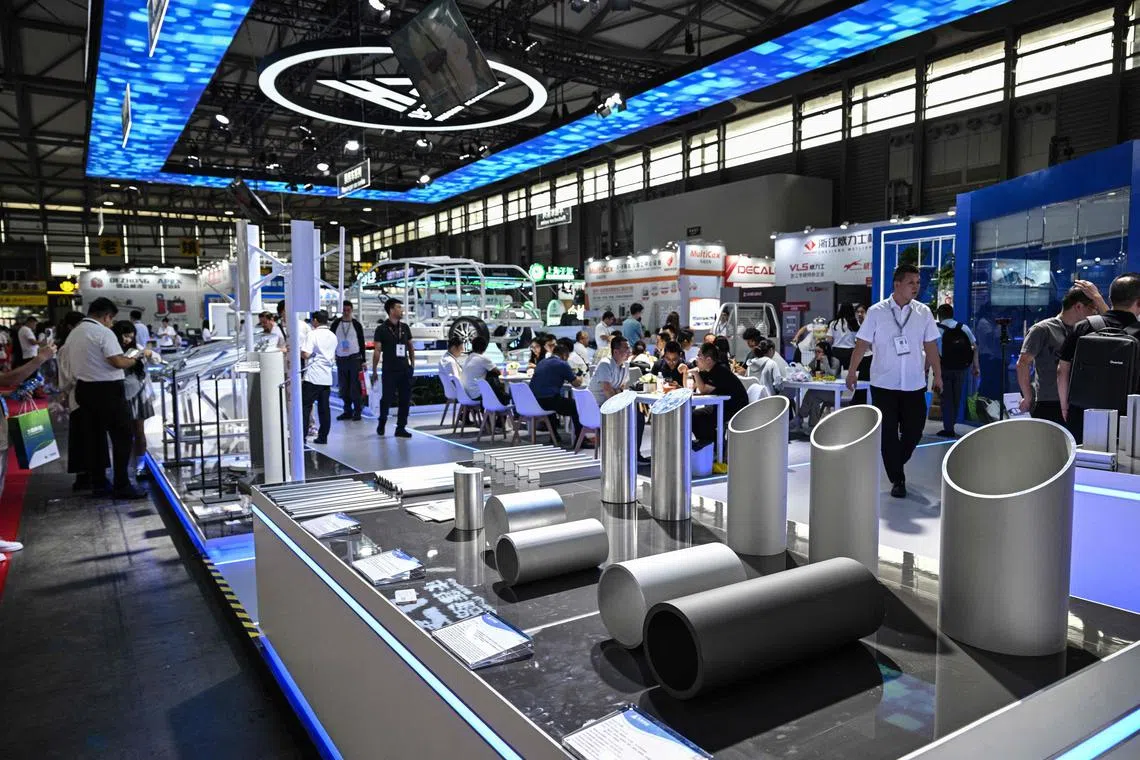China’s aluminium factories are changing to escape a crushing price war
Sign up now: Get ST's newsletters delivered to your inbox

The industry is shifting away from inexpensive metal for window frames and door handles, towards the specialised alternatives needed for iPads and airplanes.
PHOTO: AFP
Follow topic:
BEIJING - For Mr Liang Zhu, who runs an aluminium factory about 100 km north of Hong Kong, there is only one way out of China’s vicious spiral of excessive competition: shift away from inexpensive metal for window frames and door handles, and towards the specialised alternatives needed for iPads and airplanes.
Guangdong province has long been a powerhouse of light manufacturing. Today, though, many companies like Mr Liang’s are battling to survive in the era of “involution”, a term commonly used to describe the country’s intense, self-harming industrial race. China’s property boom is over, and has left behind small to medium-sized manufacturers saddled with overcapacity, evaporating margins and a relentless struggle for customers.
“Without sufficient profits, there will be no funds to invest in innovation, research or in finding solutions for society,” said Mr Liang, general manager at Guangdong Mingzhu Metal Material Technology, a company he founded after returning from a spell working in Australia. “That’s a dilemma for us, so we look for ways to get out of this so-called involution.”
Producers of aluminium to be used in railings or furniture thrived in Guangdong from the early reform years of the 1980s up until the country’s real estate crisis began in earnest five years ago. Since, the region has seen a wave of consolidation.
In July, Mingzhu Metal started up its first production line making items with “7-series” aluminium, a more complex product that’s harder to rework and weld, more resistant to heat and easier to crack when cooling. Most importantly, it has lucrative buyers in China’s emerging higher-value industries – from aerospace to electric vehicles (EV) and consumer goods.
Aluminium is arguably the world’s most versatile metal because it is lightweight, durable and does not rust. Extruders, as companies like Mr Liang’s outfit are known, take thick bars of semifinished metal and work it through several phases to form different shapes and profiles, from car frames to supports for solar panels.
This corner of the sector has long relied on real estate and infrastructure, so the collapse of construction activity since the start of the Covid-19 pandemic has been devastating. Operating rates for aluminium processors are at about 60 per cent to 70 per cent for the best-performing companies, and at only 40 per cent to 50 per cent for the weaker ones, according to researcher Shanghai Metals Market, or SMM. Both are below the 80 per cent level deemed a healthy minimum.
Midstream aluminium producers are “facing complex situations such as weak domestic demand, increased uncertainty in foreign trade, and intensified internal competition in the industry”, the China Nonferrous Metals Industry Association said in July. “The price competition situation is quite severe, and overall processing fees have reached an historic low.”
Shandong Nanshan Aluminum, a major producer of extrusions in eastern China, is a case in point. The firm said last week it’ll close 120,000 tons of its total 320,000 tons of capacity after recording utilisation rates of just 59 per cent. It plans to shift its focus to higher end products for industry and autos.
Chinese President Xi Jinping has said he wants to “break involution”, which means reducing the excessive competition and capacity levels blamed both for a cycle of domestic deflation and raising tensions with trade partners.
The campaign is taking different forms across industries. Nationwide coal output declined in July from a year ago, after government inspectors targeted mines that produce too much. Oil refining and petrochemicals are set for a sweeping overhaul. And bosses from EV companies and some tech-giants have been called before regulators and warned about over-competition.
An hour’s drive from Mingzhu Metal is China’s “aluminium capital” of Foshan, known for its panoply of extruders, fabricators and wholesale markets. Here, Foshan Golden Source Precision Manufacturing has passed through several phases of specialisation and technological upgrades since it was founded in the early 1990s.
Its showroom exhibits include trailer ramps and bathroom fittings to hard disc components and parts for the Harmony trains that pioneered China’s high-speed rail.
Most recently, Golden Source has developed components for EV charging points and lightweight fittings for airplane trolleys. When general manager Rain Tam took over the business from her father, its founder, she raised spending on technological research in order to cut costs and to improve product quality.
Even then, there is intense competition.
“Technological innovation helps profit margins for some products, but overall our margins will be a lot worse this year than last,” said deputy general manager Wang Shunli. “Right now, when it comes to pricing, I feel the pressure is extremely high.”
“Overall aluminum consumption is trending upward, but the main issues are rapid capacity expansion and severe product homogenization,” said SMM analyst Liu Xiaolei. “The aluminum industry is shifting toward new energy sectors, but these are also experiencing clear overcapacity.”
In Guangdong, managers and factory workers are settling in for a long battle. Unlike Mr Xi’s last round of supply-side reforms, there’s little prospect of massive stimulus or a renewed construction boom to restore the growth rates of the past. BLOOMBERG

